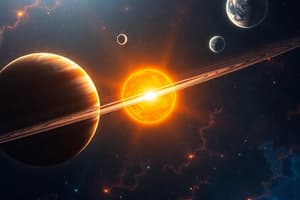Podcast
Questions and Answers
What are the two largest planets primarily composed of?
What are the two largest planets primarily composed of?
- Substances with high melting points
- Water, ammonia, and methane
- Hydrogen and helium (correct)
- Rock and metal
Which planet has the most mass after the Sun?
Which planet has the most mass after the Sun?
- Saturn
- Uranus
- Jupiter (correct)
- Neptune
What is the composition of Uranus and Neptune mainly made up of?
What is the composition of Uranus and Neptune mainly made up of?
- Water, ammonia, and methane (correct)
- Substances with high melting points
- Hydrogen and helium
- Rock and metal
Which type of planets are Mercury, Venus, Earth, and Mars?
Which type of planets are Mercury, Venus, Earth, and Mars?
What is the ecliptic?
What is the ecliptic?
Flashcards are hidden until you start studying
Study Notes
Composition of Planets
- The two largest planets, Jupiter and Saturn, are primarily composed of hydrogen and helium gases.
- Jupiter has the most mass after the Sun, making it the largest planet in our solar system.
Ice Giants
- Uranus and Neptune are mainly composed of water, ammonia, and methane ices, with a small rocky core at their center.
Inner Planets
- Mercury, Venus, Earth, and Mars are classified as terrestrial planets, meaning they are small, rocky, and have a solid surface.
Celestial Mechanics
- The ecliptic is the imaginary plane of the Earth's orbit around the Sun, which is used as a reference point for measuring the orbits of other planets and celestial objects.
Studying That Suits You
Use AI to generate personalized quizzes and flashcards to suit your learning preferences.




